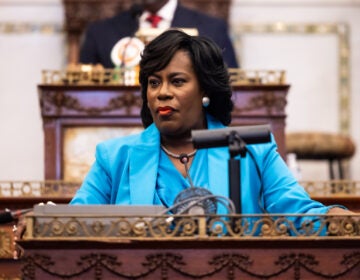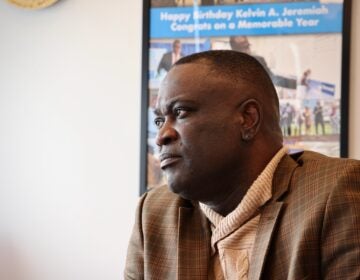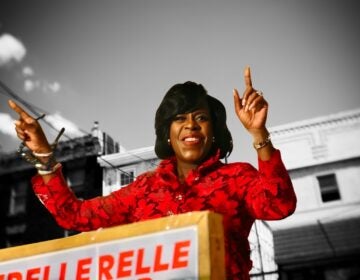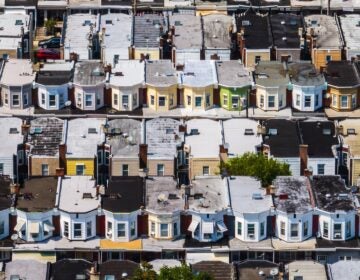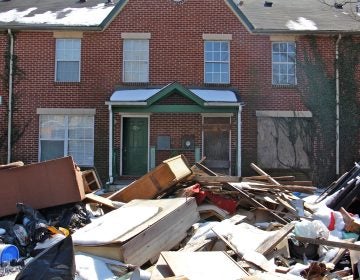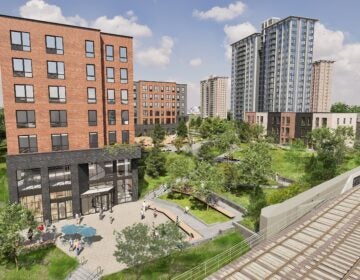Philadelphia City Council just approved Mayor Parker’s signature housing proposal. Here’s what you need to know
The $2 billion plan — the Housing Opportunities Made Easy initiative — is rooted in creating and preserving 30,000 units of housing, and is backed by a massive bond.
Listen 1:08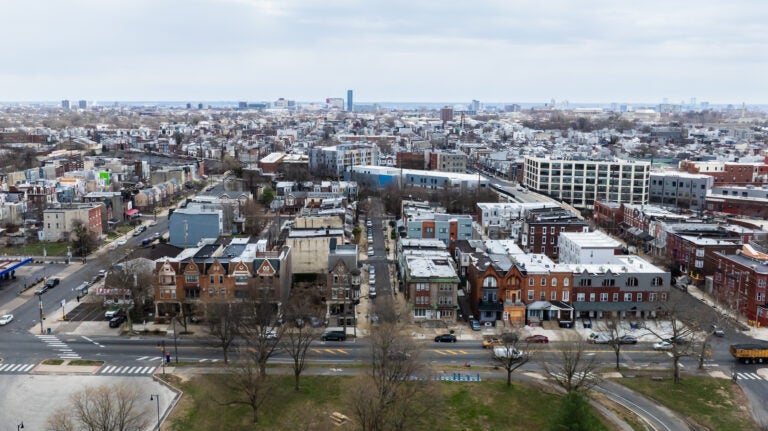
Homes in North Philadelphia (Kimberly Paynter/WHYY)
Have a question about Philly’s neighborhoods or the systems that shape them? PlanPhilly reporters want to hear from you! Ask us a question or send us a story idea you think we should cover.
Mayor Cherelle Parker’s administration has officially notched its first major policy victory.
After two budget hearings and hours of private negotiations, City Council on Thursday approved legislation crucial to the mayor’s signature housing proposal, a $2 billion strategy centered on creating and preserving 30,000 units during Parker’s time in office.
The Housing Opportunities Made Easy, or H.O.M.E. initiative, is backed by an $800 million bond — dollars the administration hopes to pair with additional public funds and $1 billion worth of city land and assets.
The funding, which is expected to start flowing in the fall, is in addition to the city’s $6.8 billion budget, which lawmakers also passed Thursday after reaching a deal last week.
Here’s what else you need to know:
What is H.O.M.E.?
Formally launched in February, the H.O.M.E. initiative is rooted in a campaign promise to make housing a top priority. Parker has said, after public safety, there is “no more important issue” than the city’s ongoing crisis.
Her administration has repeatedly cited the city’s aging housing stock, and the fact that Philly is short an estimated 17,000 units.
“We have a crisis and we want to address it now,” said Tiffany Thurman, Parker’s chief of staff. “We don’t want to be paralyzed by inaction.”
The initiative is grounded in a series of goals. It seeks to make it easier for real estate developers to build new housing; incentivize housing revitalization projects; prevent housing instability; and improve access to rental assistance and mortgage loans, among other priorities.
Under the plan, 13,500 units will be newly constructed and 16,500 will be preserved.
The administration wants the majority of those units to be affordable to households earning less than $100,000 a year. And more than 20,000 units are slated to serve families earning around half that amount.
“I am committed to working with our legislative body, this City Council, to put people on a path to self-sufficiency and will not engage in policy making that breeds class contempt, by pitting the have-nots against those who have just a little,” Parker said during a special session of Council held in March.
Some affordable housing advocates, however, have raised concerns about the plan, saying it doesn’t go far enough to help those in need of deeply affordable housing that’s safe and habitable.
A separate plan from the Philadelphia Housing Authority will remake and create thousands of units for the city’s lowest-income residents.
What will the money pay for?
The $800 million bond will be used to support more than three dozen programs, many of which already exist and will be expanded.
More than $500 million of that total is expected to support six initiatives, including programs to provide gap funding for affordable housing preservation and production.
The list also includes the Basic Systems Repair Program, a popular, long-standing initiative that provides free home repairs to low-income homeowners who can’t afford to make them. Participants can correct electrical, plumbing and heating issues, as well as roofing and some structural damage.
The Parker administration wants to expand eligibility for the program to include households earning up to 100% of area median income, a data point that includes places outside of Philadelphia. That translates to $119,400 a year for a family of four.
H.O.M.E. funds will additionally be used to put the Turn the Key program “on steroids.” The program uses city-owned land to create workforce housing for first-time homebuyers. The land is effectively donated to private developers, who then sell homes for between $190,000 and $280,000.
Considerable funding will also go toward One Philly Mortgage, a new program meant to provide 30-year fixed-rate loans to first-time homeowners earning up to 120% of area median income. The administration also wants to expand the popular Philly First Home program, which aims to help first-time homebuyers cover down payment and closing costs.
Other programs will provide rental assistance to cost-burdened tenants at risk for eviction, as well as loans to landlords to make needed repairs to their properties.
What will the bond cost taxpayers?
Under a service agreement with the city, the Parker administration expects the Philadelphia Redevelopment Authority to borrow the $800 million in two tranches, with the first expected this fall. The second would come two years later, depending on the “pace of spending,” said Finance Director Rob Dubow last week during a marathon hearing.
Combined, the two tranches are expected to cost a total of $1.3 billion when interest is taken into account. Dubow said there would be an average of $25 million a year in interest payments over 20 years.
“You issue bonds when you think something is a long-term investment and when you see the long-term payoff,” Dubow said early last month. “There’s really nothing that’s more of a long-term investment than housing.
While the H.O.M.E. initiative was widely supported by City Council, some lawmakers raised concerns about authorizing the full $800 million up front, particularly given the city’s spending history with other bond-backed programs.
Councilmember Isaiah Thomas told the administration the city has pressing fiscal needs beyond housing, including public education and poverty, and that there is still a lot of uncertainty regarding federal funding.
“We can also use those two years to maybe iron out any kinks or unanticipated problems that might exist,” said Thomas.
Will there be any oversight?
The legislation passed by Council includes provisions that give the legislative body, as well as Philadelphia’s Office of the Controller, some oversight over how the $800 million is spent.
After amendments, the Parker administration will be required to submit to Council program statements and budgets on a quarterly and annual basis. Those documents must be approved by lawmakers.
The final version of the ordinance also establishes a “Project Review Team,” which will be composed of two members appointed by the mayor and two members appointed by the City Council president.
The project review team would be authorized to change how program dollars are allocated, as long as those changes do not exceed 10% of the annual spending for H.O.M.E. If they do, the alterations will require Council to approve legislation.
During an unrelated event on Tuesday, Parker told the audience that her administration will deliver on its policy goals under the H.O.M.E. plan.
“We are going to make good on our commitment,” said Parker.

Get daily updates from WHYY News!
WHYY is your source for fact-based, in-depth journalism and information. As a nonprofit organization, we rely on financial support from readers like you. Please give today.




